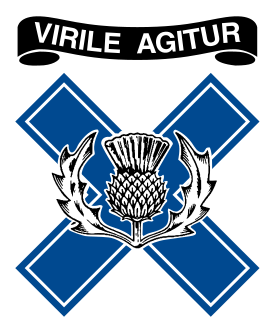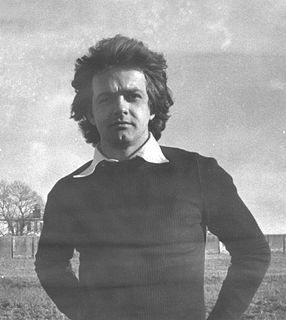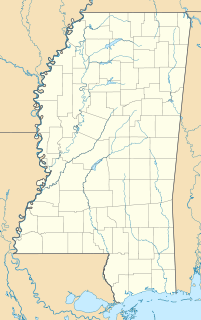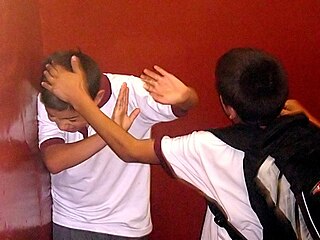
David James Pelzer is an American author, of several autobiographical and self-help books. His 1995 memoir of childhood abuse, A Child Called "It", was listed on The New York Times Bestseller List for several years, and in 5 years had sold at least 1.6 million copies.

Knox Grammar School is an independent Uniting Church day and boarding school for boys, located in Wahroonga, New South Wales, an Upper North Shore suburb of Sydney, Australia. Founded in 1924 by the Presbyterian Church of Australia as an all-boys school, and named after John Knox. The school has since grown, branching out into a large Senior School and a Preparatory School, enrolling approximately 2900 students. The school also caters for approximately 160 boarding students from Years 7 to 12. During the term of Ian Paterson as Headmaster, the school doubled in size, raised education standards and increased participation in a wealth of activities.

The Congregation of Christian Brothers is a worldwide religious community within the Catholic Church, founded by Edmund Rice. The Christian Brothers, as they are commonly known, chiefly work for the evangelisation and education of youth, but are involved in many ministries, especially with the poor. Their first school was opened in Waterford, Ireland, in 1802. At the time of its foundation, though much relieved from the harshest of the Penal Laws by the Irish Parliament's Relief Acts, much discrimination against Catholics remained throughout the newly created United Kingdom of Great Britain and Ireland pending full Catholic Emancipation in 1829.

Mark Dennis Devlin was the author of Stubborn Child (ISBN 0-6891-1476-1), a critically acclaimed memoir published in 1985. He died on March 10, 2005. The cause of death was not released but he had battled mental illness, alcoholism, and physical problems for many years. He was 56 years old.

The Mount Meigs Campus is a juvenile corrections facility of the Alabama Department of Youth Services located in Mount Meigs, unincorporated Montgomery County; the campus serves as the agency's administrative headquarters. The 780-acre (320 ha) campus, which can house 264 boys, is next to Interstate 85 North and about 15 miles (24 km) east of Downtown Montgomery. Since 2015, the separate J. Walter Wood Treatment facility for 24 girls is also located in the Mount Meigs Campus.
Gerald Francis Ridsdale, an Australian laicised Catholic priest, was convicted between 1993 and 2017 of a large number of child sexual abuse and indecent assault charges against 65 children aged as young as four years. The offences occurred from the 1960s to the 1980s while Ridsdale worked as a school chaplain at St Alipius Primary School, a boys‘ boarding school in the Victorian regional city of Ballarat. Royal Commission into Institutional Responses to Child Sexual Abuse found that senior figures in the church knew about Ridsdale's abusing children but protected him. Ridsdale was ordained at St Patrick's Cathedral in Ballarat in 1961. The first complaint about his behaviour towards children was received by the church that same year. Ridsdale held 16 different appointments over a period of 29 years as a priest, with an average of 1.8 years per appointment.
The Ohio Department of Youth Services (DYS) is the administrative department of the Ohio state government responsible for juvenile corrections. It has its headquarters in Columbus.
The Missouri Division of Youth Services (DYS) is a state agency of Missouri that operates juvenile correctional facilities. A division of the Missouri Department of Social Services, DYS has its headquarters in Jefferson City. The Division divides the state into several regions and operates facilities and offices in each region.
The Mississippi Department of Human Services (MDHS) is a state agency of Mississippi, headquartered in Jackson. The department operates the state's family services.
The Arkansas Department of Human Services (DHS) is a state agency of Arkansas, headquartered in Donaghey Plaza South of the Donaghey Complex, a five-story building on the southwest corner of Main Street and 7th Street, in Little Rock.The state agency is in charge of maintaining social services for Arkansas by providing assistance to families and monitoring/inspecting health facilities.
The Missouri Department of Social Services (DSS) is a state agency of Missouri. It has its headquarters in the Broadway State Office Building in Jefferson City. The department operates the state's social services.

The Wyoming Department of Family Services is a state agency of Wyoming, headquartered on the third floor of the Hathaway Building in Cheyenne.
The Rhode Island Department of Children, Youth & Families (DCYF) is a state agency of Rhode Island, headquartered in Downtown Providence. The agency provides services for children and families.
The Massachusetts Department of Youth Services (DYS) is a state agency of Massachusetts. Its Administrative Office is headquartered in 600 Washington Street Boston. The agency operates the state's juvenile justice services.

Oakley Youth Development Center (OYDC), formerly known as Oakley Training School is a juvenile correctional facility of the Mississippi Department of Human Services located in unincorporated Hinds County, Mississippi, near Raymond. It is Mississippi's sole juvenile correctional facility for children adjudicated into the juvenile correctional system.
Child sexual abuse in New York City religious institutions has presaged or echoed that which has occurred and emerged elsewhere in the United States and Europe. The child sexual abuse cases documented here, so far, reach back to the 1970s but have mostly come to light since 1990.
The Boy Scouts of America (BSA) is one of the largest youth organizations in the United States, with 2.7 million youth members and over 1 million adult volunteers. In 1979 there were over 5 million youths in BSA.
Jerome Gilbert Miller was an American social worker, academic and public sector corrections administrator, who was an authority on the reform of juvenile and adult corrections systems. He was a prominent advocate for alternatives to incarceration for offenders as well as for the de-institutionalization of individuals with developmental disabilities. His career involved university teaching, administration of juvenile justice services for three states, clinical work with offenders and advocacy for systemic change in public sector correctional services. Miller's work first drew national attention for his leadership in closing several juvenile reformatories in Massachusetts in the early 1970s. Miller went on to emerge as a prominent national advocate, administrator and educator working for systemic change in public sector corrections and disability service delivery systems. He was the co-founder of the National Center on Institutions and Alternatives.
















